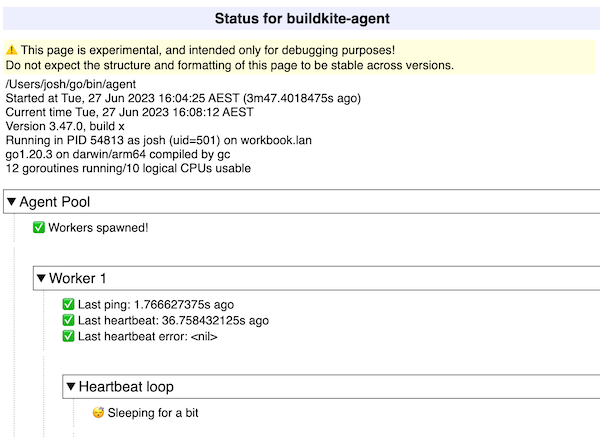Monitoring and observing the Buildkite Agent
By default, the agent is only observable either through Buildkite or through log output on the host:
- Job logs: Relate to the jobs the agent runs. These are uploaded to Buildkite and shown for each step in a build.
- Agent logs: Relate to how the agent itself is running. These are not uploaded or saved (except where the output from the agent is read or redirected by another process, such as systemd or launchd).
Health checking, metrics, and status page
The agent can optionally run an HTTP service that describes the agent's state. The service is suitable for both automated health checks and human inspection.
You can enable the service with the --health-check-addr flag or
$BUILDKITE_AGENT_HEALTH_CHECK_ADDR environment variable. For example, to
enable the service listening on local port 3901, you can use:
buildkite-agent start --health-check-addr=:3901
The flag expects a "host:port" address.
Passing :0 allows the agent to choose a port, which will be logged at startup.
For security reasons, we recommend that you do not expose the service directly to the internet. While there should be no ability to manipulate the agent state using this service, it may expose information, or provide a vector for a denial-of-service attack. We may also add new features to the service in the future.
Health checking service routes
The URL paths available from the health checking service are as follows:
-
/: Returns HTTP status 200 with the textOK: Buildkite agent is running. -
/agent/(worker number): Reports the time since the agent worker succeeded at sending a heartbeat. Workers are numbered starting from 1, and the number of workers is set with the--spawnflag. If the previous heartbeat for this worker failed, it returns HTTP status 500 and a description of the failure. Otherwise, it returns HTTP status 200. -
/metrics: (Added in Buildkite Agent version 3.113.0) Prometheus plain-text metrics describing agent behaviour over time. -
/status: A human-friendly page detailing various systems inside the agent. To aid debugging, this page does not automatically refresh—it shows the status of each internal component of the agent at a particular moment in time.
The following shows the /status page for an agent:

Prometheus metrics reference
Prometheus metrics were added to the health-checking service in Buildkite Agent version 3.113.0.
| Metric | Type | Description |
|---|---|---|
buildkite_agent_jobs_ended_total |
Counter | Count of jobs that ended in any way for any reason |
buildkite_agent_jobs_started_total |
Counter | Count of jobs started |
buildkite_agent_logs_bytes_uploaded_total |
Counter | Count of log bytes uploaded |
buildkite_agent_logs_bytes_uploads_errored_total |
Counter | Count of log bytes that were not uploaded due to an error |
buildkite_agent_logs_chunk_uploads_errored_total |
Counter | Count of log chunks that were not uploaded due to an error |
buildkite_agent_logs_chunks_uploaded_total |
Counter | Count of log chunks uploaded |
buildkite_agent_logs_upload_duration_seconds_total |
Histogram | Time taken to upload log chunks |
buildkite_agent_pings_actions_total |
Counter | Count of actions taken following a ping, by action
|
buildkite_agent_pings_duration_seconds_total |
Histogram | Time taken to ping (the API call, not including the subsequent action) |
buildkite_agent_pings_errors_total |
Counter | Count of pings that failed due to an error |
buildkite_agent_pings_sent_total |
Counter | Count of pings sent |
buildkite_agent_pings_wait_duration_seconds_total |
Histogram | Time spent waiting prior to each ping (ping interval plus jitter) |
buildkite_agent_workers_ended_total |
Counter | Count of agent workers (i.e. --spawn flag) that have stopped running |
buildkite_agent_workers_started_total |
Counter | Count of agent workers (i.e. --spawn flag) that have started running |
A count of currently-running agent workers can be found by subtracting ended_total from started_total:
sum(buildkite_agent_workers_started_total - buildkite_agent_workers_ended_total)
Similarly, a count of currently-running jobs using the same method:
sum(buildkite_agent_jobs_started_total - buildkite_agent_jobs_ended_total)
As all counter and histogram metrics are cumulative, information such as job or log throughput can be found using functions such as rate:
# Throughput of jobs started over 5m interval
sum(rate(buildkite_agent_jobs_started_total[5m]))
# Throughput of log bytes uploaded over 5m interval
sum(rate(buildkite_agent_logs_bytes_uploaded_total[5m]))
Datadog metrics
The Buildkite Agent supports sending metrics to Datadog via DogStatsD for monitoring and observability.
To enable Datadog metrics, start the agent with the --metrics-datadog option or set metrics-datadog=true in the agent's configuration file.
buildkite-agent start --metrics-datadog
Additional configuration options:
| Option | Description | ||
|---|---|---|---|
| Option | --metrics-datadog-host |
Description | The DogStatsD instance to send metrics to using UDP. Environment variable: BUILDKITE_METRICS_DATADOG_HOSTDefault: 127.0.0.1:8125
|
| Option | --metrics-datadog-distributions |
Description | Use Datadog Distributions for timing metrics. This is recommended when running multiple agents to prevent metrics from multiple agents from being rolled up and appearing to have the same value. Environment variable: BUILDKITE_METRICS_DATADOG_DISTRIBUTIONSDefault: false
|
Once enabled, the agent will generate the following metrics (duration measured in milliseconds):
buildkite.jobs.successbuildkite.jobs.duration.success.avgbuildkite.jobs.duration.success.maxbuildkite.jobs.duration.success.countbuildkite.jobs.duration.success.medianbuildkite.jobs.duration.success.95percentile
Tracing
For Datadog APM or OpenTelemetry tracing, see Tracing in the Buildkite Agent.